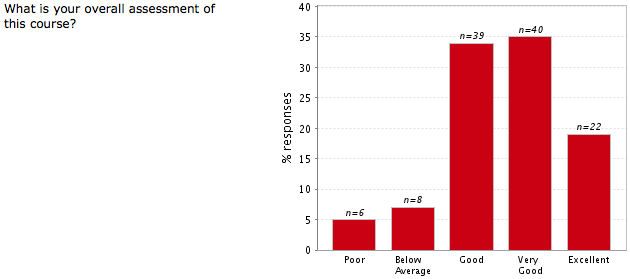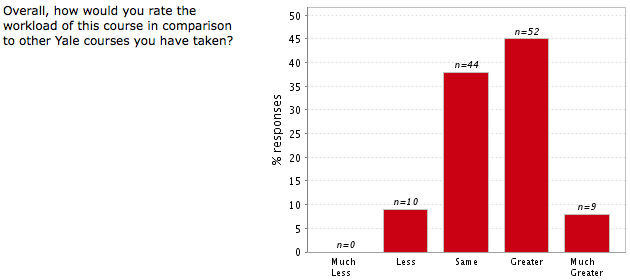How I Extract Value from Course Evaluations
[McKee was] rambling and nervous in class. Unclear and rushed when teaching math.
Pretty atrocious class. Take it if you must.
He really cares a lot about teaching but still needs to find a more effective way of doing it.
Prof. McKee likes to think he is a conscious, self-aware teacher. And he’s a really nice guy, smiles, and talks at a very slow pace. Yet for some reason, he is not great at explaining difficult concepts he expects students to solve in exams - he rushes through the explanations.
These are real quotes from the course evaluations for my Fall econometrics class. Those last two sting because they’re true: I do need to get better at explaining difficult concepts, and more importantly, I need to get better at teaching my students how to tackle difficult problems on their own. I’m sure almost everyone who has taught college classes has similar critical quotes they remember well from their own evaluations. It’s no wonder faculty dread reading these things! Erik Benson at ipsative writes insightfully about how we shouldn’t treat evaluations too seriously, but we also agree that there can be real value to be found in them. Today I want to share and walk through my process for exracting this value.
Most people focus on their quantitative ratings, and unfortunately, that’s often how administrators summarize an instructor’s quality. At Yale, we ask students to give their overall assessment of the course and rate the workload on five point scales. Here’s how I did:

I’m glad relatively few people rated the class Poor or Below Average, and while it would have been nice if more students rated the class as Excellent, the fact is I already know there is a lot of room for improvement. I think these ratings are a reasonably accurate representation of course quality, but I don’t learn much from them.

There are several ways to achieve high ratings and one is to make the course easy. I’m happy to report that that’s not going on here.
Now we get to the meat, the free text answers to these questions:
Looking back on Economics 131-01 , what is your overall assessment of the course? What are its strengths and weaknesses, and in what ways might it be improved?
Please evaluate each instructor of Economics 131-01 . What are the instructor’s strengths and weaknesses, and in what ways might his or her teaching be improved?
How would you summarize Economics 131-01 for a fellow student? Would you recommend Economics 131-01 to another student? Why or why not?
My first step, before diving right in, is to take some deep breathes and try to keep emotion out of the process. You have to recognize there will almost always be at least a few people who just didn’t like the class. Maybe it’s you and maybe it’s not.
Next, I start three lists:
- What didn’t work: I make categories and count how many students complain about each thing. It’s easy to quickly read through the responses and think something is a big problem when it’s actually just one or two students raising the issue.
- What worked: My second list is holds what they liked about the class. This keeps me grounded and reminds me that I don’t have throw the whole thing out and start over to improve the class.
- Ideas for next time: As I read the evals, I get ideas for things I could change. I write them all down. Some of these ideas improve learning. Some will improve my efficiency. Much later I decide what to actually implement.
After carefully going through all my students’ responses and populating these lists, here’s what I learned:
- Most of my students were pretty happy and they appreciated my effort.
- I have to do a better job connecting the mathematical part of the class with the data analysis part of the class.
- A vocal minority wanted me to spend more time on the math behind the concepts.
- I don’t think very many of them read the book as only two students mentioned it: One hated it and one liked it better than the lectures.
- My slides could be more explicitly organized.
- Most of them liked the interactivity and want more of it during lectures.
The most interesting thing I learned was that several students thought the exams were too difficult. That’s not so great because I thought the exams were on the easy side. At a minimum, we need to spend more time working through complex problems, probably during class.
Writing up your findings as a memo to yourself is a critical step–This is what you’re going to open before you start planning the next iteration of the class. When that time comes, you’ll pick a few things to change and the class will get better. If you feel like you’ve learned things that might help other folks, by all means share them on your blog, Facebook, Twitter, an email to your colleagues, or whereever you are comfortable.
There’s one more important thing you can get out of reading your evaluations: Some students say kind and inspiring things. I try to remember these quotes as much as the critical ones. Here’s what one student said not in the “official” evaluations, but on my own more specific anonymous feedback survey:
the role of a teacher isn’t to deliver information, but to excite their students to want to learn, make every student feel accountable for his/her learning, guide the social process of learning. and you nailed that. thanks professor
Maybe I didn’t succeed with every student last semester, but I accomplished the mission with that one.